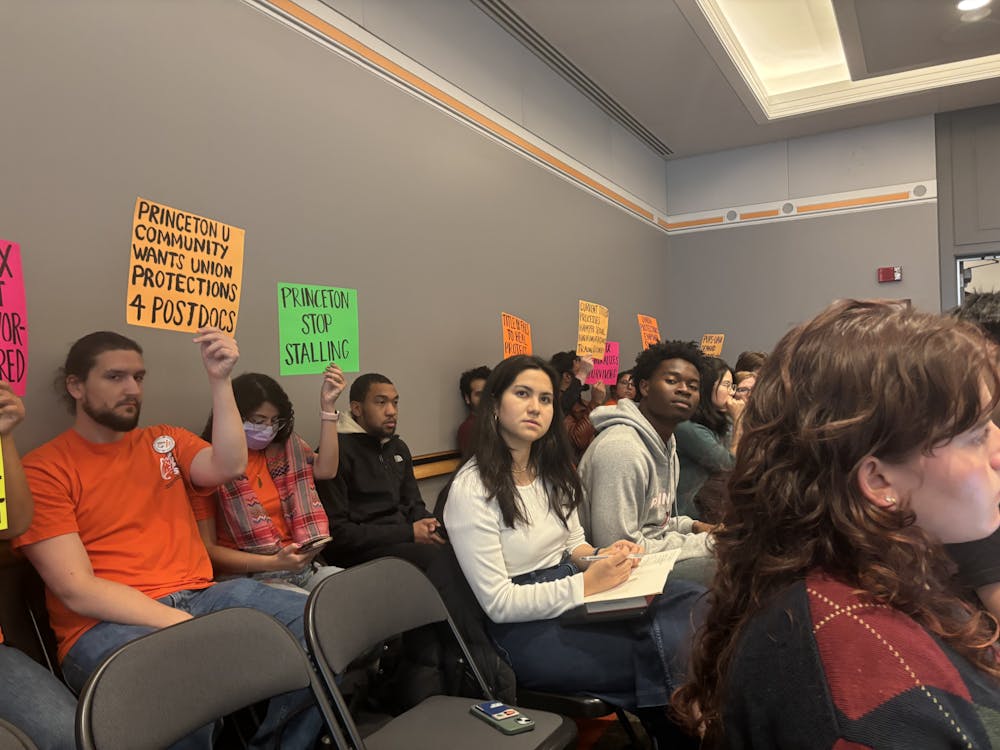Correction: A previous version of this piece did not include the fact that the policy specifically prohibits recording conversations, in addition to meetings, “occurring in an educational, residential, research or workplace setting,” without the consent of all participants. The ‘Prince’ regrets this error.
The Council of the Princeton University Community (CPUC) voted overwhelmingly on Monday to prohibit any recording of a broad category of campus activities without the permission of all participants, with few exceptions.
“Princeton prohibits the installation or use of any device for listening, observing, photographing, recording, amplifying, transmitting or broadcasting sounds or events occurring in any place where the individual or group involved has a reasonable expectation of being free from unwanted surveillance, eavesdropping, recording or observation without the knowledge and consent of all participants subject to such recordings,” the policy reads. Violations may result in disciplinary action, although it was not immediately clear how the University would enforce the policy or whether it is in effect.
This includes secret recording of any meeting or conversation that occurs “in an educational, residential, research or workplace setting, including off-campus University sponsored activities.” Additionally, the policy states that recording can also be prohibited at public meetings or events “when it has been explicitly stated that recording is not permitted.”
Vice President for Campus Life Rochelle Calhoun said that the University had been weighing changes to recording policies since 2019, although they were interrupted by the pandemic.
University administrators have previously attempted to limit recording at CPUC meetings (although the new policy extends into informal settings as well). In April 2024 during the “Gaza Solidarity Encampment,” Provost Jennifer Rexford ’91 proposed a motion to ban independent video recording of CPUC meetings, although the push ultimately failed.
The University couched the new policy in terms of preserving privacy. According to Calhoun, the policy aims to ensure that the use of recording devices does not violate community members’ “reasonable expectation of privacy” in order to promote a “mutually respectful environment.”
The exact language of the policy was shared only with CPUC members, although Calhoun did provide an overview of its key points.

The policy included several exceptions, such as Public Safety body cameras and recording devices, recordings approved as accommodations for disabilities, and those used in University investigations.
The new policy follows the leak of recordings of two Residential College Advisor training sessions focused on diversity, equity, and inclusion to the National Review, a conservative news outlet. That specific incident was not brought up at the CPUC meeting.
The University did not clarify how the prohibition would be enforced, although Calhoun implied that community members could bring complaints about the policy.
“We’re not surveilling or patrolling all of these platforms. The likely scenario is that someone will have [an] objection to a violation or what they perceive to be a violation,” she said.

There will be no disciplinary committee specifically for the violation of the updated policy, according to the meeting packet given to CPUC members, which said that disciplinary action would depend “on the severity of the particular infraction and any aggravating or mitigating circumstances.”
Many CPUC meeting attendees expressed concerns about the policy’s potential to exacerbate power imbalances between meeting organizers and attendees. “It reads together that the intent is that the prohibition on the recording is mostly for people who are not conveners, because essentially, the convener or any meeting can actually override that,” said Jim Bosch, a senior professional specialist in the Department of Astrophysical Sciences.
“I think everything you said is true,” Calhoun replied, adding that meeting organizers are responsible for including attendees in the decision to grant or bar recording.
When other attendees asked for clarification on the new policy, Calhoun pointed them to forthcoming FAQs that have not yet been released.
After 15 minutes of questions from CPUC members and from public participants, Eisgruber called a vote from the council members to approve the updated policy, which passed overwhelmingly with no votes against. There was at least one abstention, from U-Councilor Genevieve Shutt ’26.
At Monday’s meeting, the CPUC also approved changes to the University’s discrimination and Title IX policy. The changes include a new definition of “objectively offensive conduct,” as well as new language about protecting speech in academic contexts.
“Accordingly, the adjudication of possible violations of this policy will take into account that expression occurring in an academic, educational or research context is considered a special case and is broadly protected by academic freedom, and that such expression will not constitute harassment unless it: (a) satisfies all of the requisite elements, (b) targets a specific person or persons, and (c) serves no bona fide academic purpose,” the discrimination policy now reads.
Silent protestors for the post-doc union also sat in on the meeting. Around ten postdoctoral researchers held signs claiming negotiations over sexual harassment policy had stalled, including “Princeton U Community Wants Union Protections 4 Post Docs” and “Current Title IX Processes Hamper Sexual Harassment/Assault Trauma Recovery.”
Cynthia Torres is an associate News editor, and Archives contributor. She is from New Bedford, Mass. and typically covers University administration. She can be reached at ct3968[at]princeton.edu.
Benedict Hooper is a News contributor for the ‘Prince.’ He is from Greenwich, Conn. and can be reached at bh3193[at]princeton.edu.
Please send any corrections to corrections[at]dailyprincetonian.com.
Correction: A previous version of this piece said that the recording resolution passed unanimously. In fact, there was at least one abstention. A previous version of this piece also said that around eight students held signs at the CPUC meeting. There were actually around ten, and they were postdoctoral researchers.








